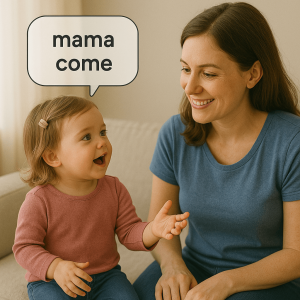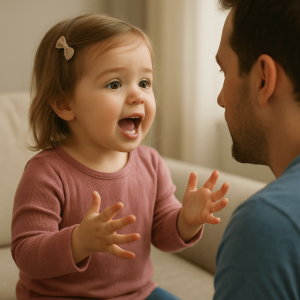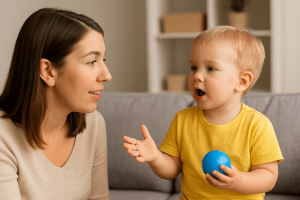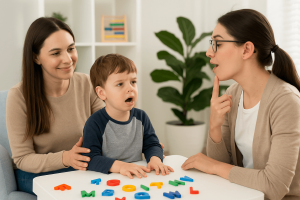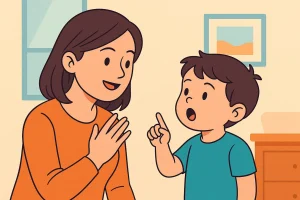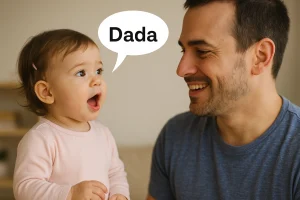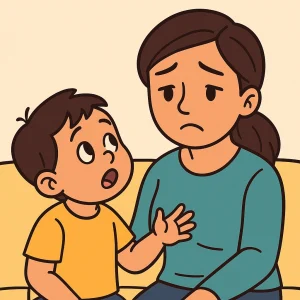Language Development Stages in Children: A Parent’s Guide
Last Updated: November 19, 2024
Welcome to the incredible world of your child’s language development! From their very first coo to those delightful full sentences, each sound and word marks an essential step in the language development stages, guiding their journey towards effective communication. Understanding this progression isn’t just fascinating—it’s crucial. Why? Because early language skills are more than just a way for your child to express their needs and desires; they are foundational to thinking, problem-solving, and relationship-building as they grow.
What is Language Development?
Language development is an exciting journey that starts from the moment your child first hears voices and continues as they grow into chatty preschoolers. It’s all about how young children learn to understand and use language to communicate.
Also read: Language Development: Stages, Tips, and Common Challenges
The Stages of Language Development
- Starting Small: It begins with coos and giggles. Early on, babies make noises and use simple gestures to reach out to the world around them. Each coo or cry might be a baby’s way of saying hello or asking for help.
- First Words: Around their first birthday, most toddlers start to speak their first understandable words. These are the building blocks of language, like “mama” or “dada,” which they use to express their needs and feelings.
- Building Blocks: As they move from babbling to speaking real words, toddlers learn how to string these words together to form short sentences. This lets them share thoughts and ask questions, opening up a whole new world of interaction.
- From Words to World: By the time children are preschoolers, they’re not just talking but communicating complex ideas. They learn to tell stories, ask loads of questions, and express their feelings in more sophisticated ways.
Why Does It Matter? Helping your child develop language skills is more than just teaching them to talk. It’s about helping them connect with others, understand their feelings, and explore the world. Language is a key part of their ability to learn and grow throughout their lives.
Stages of Language development:
1. Pre-linguistic Stage: The Foundations of Communication
What happens before the words? Before your baby starts speaking actual words, they are already hard at work learning how to communicate. This pre-linguistic stage, stretching from birth to about 12 months, is when your infant begins to understand the basics of human communication through crying, cooing, laughing, and other vocalizations. These early sounds are your baby’s first steps in the dance of dialogue, setting the groundwork for later speech.
Practical Tips: How You Can Help Your Baby “Talk” Without Words
- Talk to Your Baby Often: Even if they can’t understand the words yet, hearing your voice helps your baby pick up on various sounds and rhythms of language.
- Respond to Cooing: When your baby coos, coo back. This back-and-forth interaction is crucial and forms the basis of conversation.
- Read Aloud: It’s never too early to start reading to your child. The different tones and inflections in your voice as you read help your baby to differentiate sounds.
- Play Sound and Gesture Games: Peek-a-boo and other games involving gestures help your baby to connect actions with communication.
- Be Expressive: Use facial expressions and gestures to communicate emotions and meanings. Your baby will start understanding the non-verbal cues of communication.
Also read: Speech and Language Milestones: 0 to 12 Months
2. Early Language Development: From Babbling to Words
The magic of the first word! As your child moves into the toddler phase, typically between 12 to 18 months, those initial babbles begin to take on more structure. This stage is where the real fun begins as your toddler starts experimenting with sounds, eventually shaping them into recognizable words. This transition from babbling to speaking is nothing short of magical and is a significant milestone in language development.
Fun Activities to Turn Babbling into Early Conversations
- Narrate Your Day: As you go about your day, narrate your actions and involve your toddler. For example, say, “Mommy is putting on her shoes. We’re going to the park!”
- Expand on Single Words: When your toddler says a word, expand on it. If they say “ball,” you can respond with “Yes, that’s your red ball!”
- Sing Songs Together: Songs that have repetitive and simple melodies are particularly appealing to toddlers. Sing together and encourage your child to try making the sounds with you.
- Name Everything: Point out and name objects during your walks or at home. Frequent exposure to these names helps toddlers make a quicker connection to language.
- Encourage Imitation: Toddlers love to mimic. Use this to your advantage by making animal sounds or funny noises and encouraging your toddler to copy you.
Know more: Toddler Speech Development: From Babbling to First Words
Language Development Milestones
| Age Range | Language Milestones | Parent Tips |
| 0-6 Months | Cooing, smiling, and reacting to sounds. | Talk and sing to your baby frequently. |
| 6-12 Months | Babbling, using gestures, recognizing names. | Respond to babbling, use gestures like waving. |
| 12-18 Months | Saying first words, following simple instructions. | Name common objects, engage in simple games. |
| 18-24 Months | Combining two words, vocabulary explosion. | Expand on their words, read simple stories. |
| 2-3 Years | Forming sentences, asking questions. | Encourage them to talk about their day, introduce new words. |
| 3-4 Years | Using complex sentences, understanding rules. | Play role-playing games, read more complex stories. |
| 4-5 Years | Using language for reasoning, telling stories. | Discuss books, encourage storytelling and jokes. |
3. Expanding Vocabulary in Toddlers: A Milestone Guide
From words to phrases
Witnessing your toddler’s vocabulary bloom from individual words to two-word phrases and beyond is one of the most exciting aspects of language development. Between 18 and 24 months, toddlers begin to string words together, forming simple sentences that start to give you a delightful glimpse into their thoughts.
Simple Ways to Boost Your Toddler’s Language Skills Every Day
- Consistent Communication: Engage in constant verbal interaction. Describe your actions, talk about what you see, and narrate your day. This continuous exposure helps your toddler to pick up new words and understand sentence structure.
- Read Regularly: Incorporate books into your daily routine. Choose picture books with simple text and vibrant illustrations to discuss and expand on the story. Ask questions like, “What do you see?” or “What is the dog doing?” to encourage speech.
- Play with Purpose: Use educational toys that prompt your child to speak. Toys that involve sorting shapes, naming colors, or solving simple puzzles can be great for prompting vocabulary use.
- Sing Songs and Recite Rhymes: Engaging in singing and rhyming helps toddlers recognize sound patterns and develops memory for sequences of words, which is fundamental for language development.
- Label the Environment: Label items around your home with their names. This visual aid helps toddlers connect words to their corresponding objects, reinforcing their vocabulary.
4. Advanced Language Skills: Communication in Older Children
Chatting champions
From age 2 to 5, children make significant leaps in language ability. They begin to form complex sentences, tell simple stories, and can engage in longer conversations that demonstrate their growing understanding of the world around them.
Engaging Games and Reading Tips to Sharpen Those Advanced Language Skills
- Storytelling Adventures: Encourage your child to tell their own stories. You might start a story and let them finish it, or ask them to tell you about their day using full sentences.
- Question Games: Play games that involve answering ‘wh’ questions (who, what, where, when, why). For instance, during a story, pause and ask, “Why do you think she did that?” or “What do you think will happen next?”
- Role Play: Engage in role-playing games where your child can act out different scenarios. This not only boosts language skills but also enhances social understanding.
- Advanced Reading Time: Choose books that are slightly above their current reading level to challenge their comprehension and vocabulary. Discuss the books in detail to ensure understanding and further build language skills.
- Word of the Day: Introduce a ‘word of the day’ to your child. Make it fun and relevant to their interests, and try to use it in conversations throughout the day.
Conclusion
Every giggle, word, and sentence your child utters is a step in their amazing journey of language development. These stages aren’t just milestones; they’re the building blocks for communication and understanding. Keep the conversations flowing—read together, chat about your day, and play language-rich games. At Wellness Hub, we’re here to guide you with resources that make learning fun and impactful. Dive into our Learning Center for more tips and tricks. Together, let’s help your little one find their voice and thrive in the world—one word at a time!
Frequently Asked Questions:
1. What are the first signs of language development in babies?
The first signs of language development in babies include cooing, babbling, and making a variety of sounds. These early vocalizations are a baby’s way of experimenting with language. You might also notice your baby responding to their name, turning towards sounds, and showing excitement when spoken to.
2. When do babies usually say their first word?
Most babies begin to say their first meaningful words around their first birthday. Common first words are “mama” and “dada,” but any specific and consistently used word counts, like “ball” or “milk.”
3. How can I help my toddler speak more clearly?
To help your toddler speak more clearly, engage them in regular conversation, repeat correct pronunciation without criticizing, and expand on their sentences. For example, if they say “cat,” you can respond with, “Yes, that’s a big, black cat.” Reading books, singing songs, and playing verbal games also support clearer speech.
4. What should I do if my child isn’t talking at 18 months?
If your child isn’t talking by 18 months, it might be helpful to consult with your pediatrician or a speech-language therapist. They can evaluate if your child’s language delay is within a normal range or if there are interventions that could help.
5. How many words should a 2-year-old know?
By the age of 2, children typically know about 50 to 100 words. They often start to combine these into two-word phrases like “more milk” or “go park,” showing their growing ability to use language to communicate more complex ideas.
6. Why is my 3-year-old not forming sentences?
If a 3-year-old isn’t forming sentences, this might indicate a delay in language development. Language development varies widely among children, but not forming sentences by age three warrants a discussion with a healthcare provider to rule out any underlying issues and discuss possible language intervention strategies.
7. Can singing songs help my child’s language development?
Absolutely! Singing songs and engaging in nursery rhymes help children learn new words, understand the flow of language, and develop memory skills. It also introduces rhythm and can help with the pronunciation of words through repetition and tunes that emphasize syllables.
8. What are some simple language activities I can do with my preschooler?
Simple language activities for preschoolers include reading together daily, playing games that require following directions (like Simon Says), engaging in role-play, and discussing the events of the day. You can also introduce new vocabulary during everyday activities, like cooking or grocery shopping.
9. How important is it to read to my child every day?
Reading to your child every day is crucial for their language development. It exposes them to complex language structures, enhances vocabulary, and improves listening and comprehension skills. It also stimulates imagination and curiosity while strengthening the parent-child bond.
10. What are signs of a language development issue in a child?
Signs of a language development issue can include not babbling as an infant, speaking less than 20 words by 18 months, not using spontaneous two-word phrases by age 2, struggling to follow simple instructions, or generally not using language in a way that’s typical for their age group.
About the Author:
Shravanaveena Gajula
M.Sc ., Speech and Language Pathology (9+ years of experience)
Shravanaveena Gajula is a dedicated Audiologist and Speech-Language Pathologist with a BASLP and an M.Sc in Speech and Language Pathology. With experience spanning multiple settings, including Wellness Hub and Ashray Akruti, Veena specializes in a wide range of disorders from developmental issues in children to speech and language assessments in adults. Her expertise includes parent counseling, managing speech sound and fluency disorders, and creating individualized therapy programs. Veena is also PROMPT certified and an author of several insightful blogs on speech and language pathology, aiming to educate and assist caregivers in supporting their loved ones.
Book your Free Consultation Today
Parent/Caregiver Info:
Client’s Details:
* Error Message

